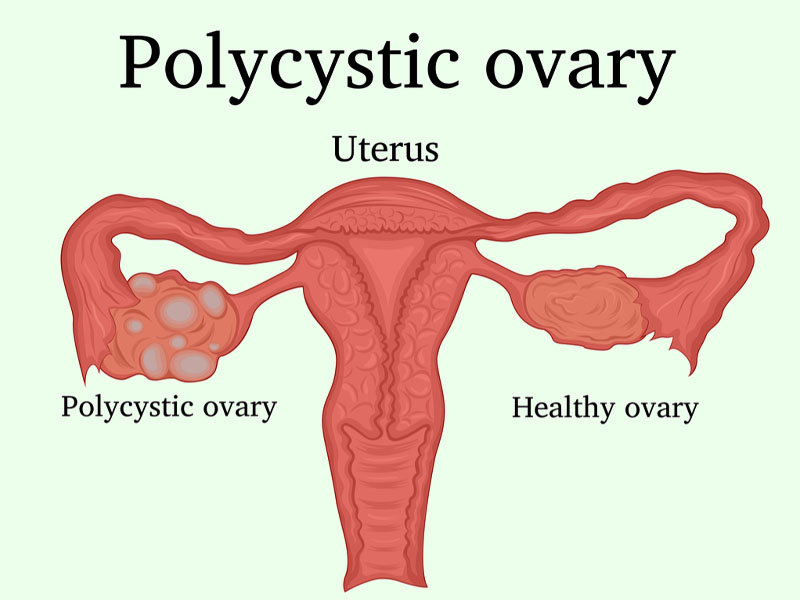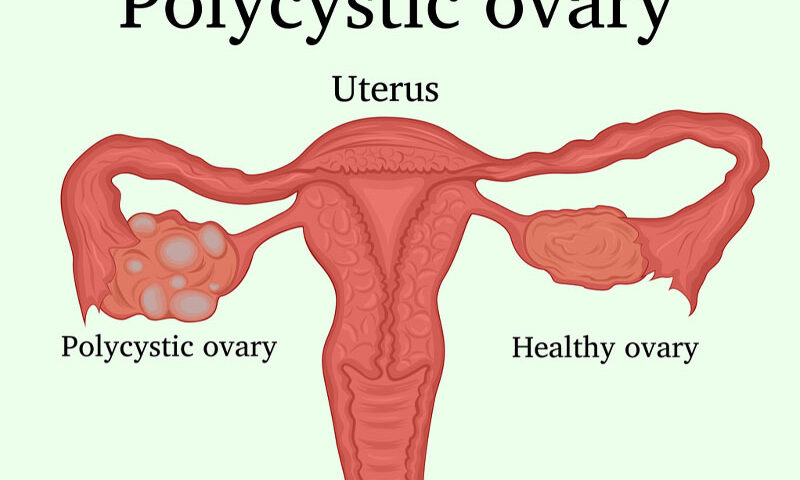Polycystic Ovary Syndrome (PCOS) Treatment in Ayurveda

Ayurvedic Treatment for PCOS/ PCOS Treatment in Ayurveda
Polycystic Ovary Syndrome (PCOS) is a common endocrine disorder that affects women of reproductive age. It is characterised by hormonal imbalances, irregular menstrual cycles, and the presence of multiple cysts on the ovaries. PCOS can lead to various health complications if not managed properly. In this article, we will explore what PCOS is, its etiological factors, symptoms, types, complications, and how Ayurveda approaches its management. Additionally, we will discuss the importance of diet, lifestyle modifications, exercise, Ayurvedic herbal remedies, and therapies in the treatment of PCOS.
What is PCOS? PCOS, or Polycystic Ovary Syndrome, is a hormonal disorder that affects the ovaries and disrupts the normal ovulation process. In PCOS, the ovaries produce higher levels of androgens (male hormones) than usual, leading to the formation of small fluid-filled sacs (cysts) on the ovaries. These hormonal imbalances can cause irregular or absent menstrual cycles, difficulties in conceiving, and various other health issues.
Etiological Factors of PCOS The exact cause of PCOS is not fully understood, but several factors contribute to its development. These factors include genetics, insulin resistance, hormonal imbalances, and lifestyle choices. Family history of PCOS, sedentary lifestyle, and unhealthy dietary habits are also known to increase the risk of developing PCOS.
Symptoms of PCOS PCOS can manifest through a variety of symptoms, which may vary from person to person. Common symptoms include irregular or absent menstrual periods, excessive hair growth (hirsutism), acne, weight gain, and fertility problems. Additionally, some women with PCOS may experience mood swings, fatigue, and sleep disturbances.
Types of PCOS While PCOS presents with similar symptoms, it can be classified into different types based on the predominant symptoms and hormonal imbalances in each individual. Understanding the specific type of PCOS can help tailor treatment approaches for better results.
Complications in PCOS If left untreated, PCOS can lead to various health complications, such as insulin resistance, type 2 diabetes, high cholesterol levels, high blood pressure, and cardiovascular diseases. It can also cause difficulties in getting pregnant (infertility) and may impact emotional well-being due to the psychological effects of the condition.
Ayurvedic Concept and Management of PCOS Ayurveda, the ancient system of medicine from India, offers a holistic approach to managing PCOS. According to Ayurveda, PCOS is believed to be caused by an imbalance in the doshas (vital energies), particularly Vata and Kapha. The condition is known as "Artava Kshaya" in Ayurveda, which refers to a decrease in the quality and quantity of menstrual blood.
Ayurvedic management of PCOS focuses on restoring the balance of doshas, improving digestion, and promoting overall well-being. Ayurvedic practitioners adopt a personalized approach to treatment, considering each individual's unique constitution and imbalances. The treatment may include a combination of Ayurvedic herbs, dietary changes, lifestyle modifications, and therapeutic procedures.
Precautions to Avoid Aggravating PCOS To manage PCOS effectively, certain precautions should be taken to prevent exacerbating the condition. These include adopting a balanced and nutritious diet, maintaining a healthy weight, staying physically active, managing stress, and avoiding unhealthy habits such as smoking and excessive alcohol consumption.
Diet and Lifestyle in the Treatment of PCOS Diet plays a crucial role in managing PCOS. Ayurvedic practitioners recommend a diet that balances the doshas and supports hormonal equilibrium. This may involve consuming fresh, organic foods and avoiding processed and sugary items. A diet rich in fruits, vegetables, whole grains, and lean proteins is beneficial for women with PCOS.
Lifestyle modifications are equally important in PCOS management. Regular exercise, yoga, and meditation can help reduce stress, improve hormonal balance, and enhance overall well-being. Adequate sleep and proper stress management techniques are also emphasised to promote hormonal harmony.
Recommendation of Exercise for PCOS Regular exercise is an essential component of PCOS management. Engaging in activities like brisk walking, swimming, and aerobic exercises can help improve insulin sensitivity and promote weight loss. Yoga, in particular, has been found to be beneficial in managing PCOS symptoms and enhancing fertility.
Ayurvedic Herbal Remedies for PCOS Ayurvedic herbs play a significant role in managing PCOS. However, it is essential to consult Ayurvedic practitioners to determine the most appropriate herbs based on an individual's specific condition and body constitution. Herbal remedies in Ayurveda are chosen based on their unique properties and effects on the doshas, aiming to restore balance and alleviate PCOS symptoms.
Ayurvedic Therapies for PCOS Ayurvedic therapies can complement the herbal remedies and lifestyle changes in managing PCOS. Therapeutic treatments like Abhyanga (Ayurvedic oil massage), Swedana (herbal steam therapy), and Panchakarma (detoxification) can help detoxify the body, improve circulation, and promote hormonal balance.
Why Ayur Healthcare At Ayur Healthcare, we are dedicated to providing personalised Ayurvedic treatments for PCOS. Our team of experienced Ayurvedic practitioners carefully assess each individual's health condition and design customised treatment plans. We prioritise safety and efficacy in our approach, ensuring that our patients receive the best possible care.
Conclusion PCOS is a complex hormonal disorder that requires a comprehensive approach for effective management. Ayurveda offers a holistic perspective, emphasising the importance of balancing the doshas, adopting a healthy lifestyle, and using Ayurvedic herbs and therapies to address the root causes of PCOS. With personalised treatment plans and expert guidance from qualified Ayurvedic practitioners, women with PCOS can experience improvements in their overall health and well-being. However, it is essential to remember that individual results may vary, and consulting qualified Ayurvedic practitioners is crucial for personalised treatment plans. The content provided on this website is for educational purposes only and should not be considered as medical advice or a substitute for professional healthcare.




